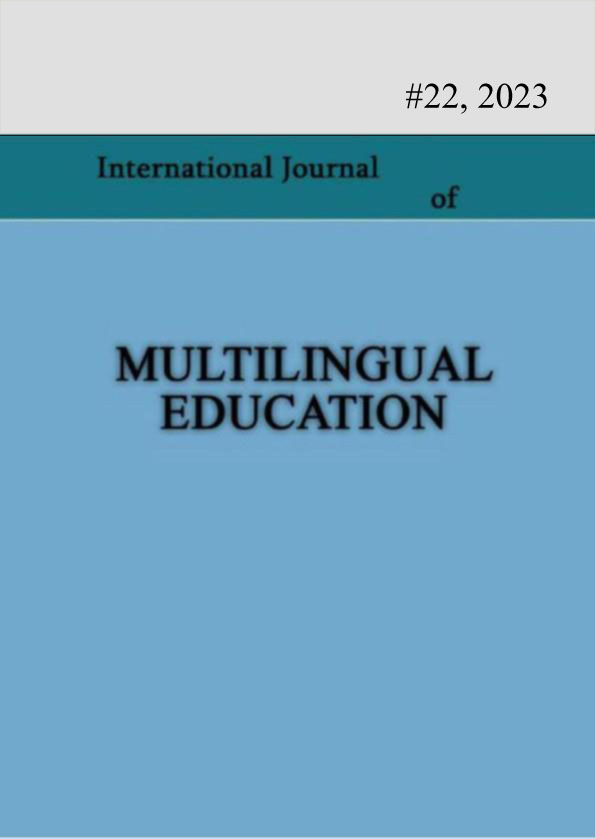Supplementary materials and multilingual classroom
Keywords:
multilingual, supplementary, productive, skill, speaking.Abstract
Nowadays, the process of globalization resulting in the advancements of international relations and close cooperation in every field among individual states as well as the increase in the migration of people to various countries worldwide have conditioned the creation of multilingual societies. In this respect, the education system is not an exception and multilingual classrooms have become common at the educational institutions including HEIs. At Tbilisi State University multilingual classrooms mostly consist of the students of Georgian, Armenian, Azeri, Ukrainian and Russian nationalities who vary from each other according to their cultural, traditional
backgrounds and religious affiliation. Their main problem for interaction represents the language barrier that is even more acutely revealed in the learning process. The necessity of successful implementation of this process poses new challenges to teaching English as a second language and sets the new objectives to English teachers in multilingual classrooms where the differences in students’ learning needs and knowledge level are added the distinctions existing between their backgrounds. Having a good command of any foreign language means being perfectly capable of communicating, reading, writing and listening. Hence, the acquisition of a target language requires the development of all the necessary language skills of students. English teachers constantly seek for the new methods and approaches facilitating the process of learning the language. The goal of this paper is to highlight the importance of using supplementary materials as an effective tool providing the enhancement of strategies and techniques of teaching the second language – English in the multilingual environment. Despite the fact that modern English text books are complex and comprehensive encompassing the materials which are targeted at all the components of language learning, they still do not suffice to teach English in multilingual classrooms. The paper deals with the utilization of additional educational sources for developing learners’ productive skill, namely, speaking as well as the strategy of selecting the supplementary materials and their integration with the course book for the purpose of fostering students’ learning process and outcomes in multilingual environment.
The paper also reviews the research which was conducted in the multilingual classroom with 12 students involved (5 -Georgian, 4 –Azeri, 3- Armenian students). The research method applied was a survey through the questionnaire to provide the formative assessment and the final exam (testing fluency and accuracy) through the interview and oral presentations for the summative
assessment of students. The research findings confirmed the positive effect of using supplementary materials on students’ learning outcomes, particularly, on developing the speaking skill in the multilingual classroom
References
Abadi P.C.(2015), Developing Speaking Skill in EFL English Course, Journal on English as a Foreign Language, Volume 5, Number 2, |p. 133).
Dodd A.R., Camacho G.K., Morocho E.L., Paredes F.M., Zúñiga A., Pinza E. I., Toro L.V., Vargas A.B., Benítez C.D. & Rogers S. (2015). The Use of Supplementary Materials in English Foreign Language Classes in Ecuadorian Secondary Schools, English Language Teaching; Vol. 8, No. 9; ISSN 1916-4742 E-ISSN 1916-4750, p.187 .
Goodman B.M. (2008). Teachers’ Perceptions of Multicultural Education, p.10.
Hatipoglu C., TESTING AND ASSESSMENT OF SPEAKING SKILLS, TEST TASK TYPES AND SAMPLE TEST ITEMS, chapter VI, pp. 125, 151.
Ismaili M.(2015), Procedia- Social and behavioral Sciences 199, p. 190. National Association of Multicultural Education (NAME)
Okal B.O. (2014) Benefits of Multilingualism in Education, Universal Journal of Educational Research 2(3): 223-229, 2014, DOI: 10.13189/ujer.2014.020304, http://www.hrpub.org, p.1)
Sharma K. (2006:80) cited by Mahmutoglu H., Kicir Z. ( 2013) in THE USE OF MOTHER TONGUE IN EFL CLASSROOMS, EUL Journal of Social Sciences (IV:I).
Thakur V.S.,(2015) Using Supplementary Materials in the Teaching of English: Pedagogic Scope and Applications, English Language Teaching; Vol. 8, No. 12; ISSN 1916-4742 E-ISSN 1916-4750 Published by Canadian Center of Science and Education, doi:10.5539/elt.v8n12, p.1
Spratt M., Pulverness A., Williams M. The TKT Teaching Knowledge Test Course, Cambridge University Press, (Published in collaboration with Cambridge ESOL UNIVERSITY of CAMBRIDGE ESOL Examinations)
Downloads
Published
How to Cite
Issue
Section
License
Copyright (c) 2023 Tsisana Giguashvili, Dali Sanaia

This work is licensed under a Creative Commons Attribution-NonCommercial 4.0 International License.
Copyright (c) - Authors who publish with this journal agree to the following terms: Authors retain copyright and grant the journal the right of first publication with the work simultaneously licensed under a Creative Commons Attribution-Noncommercial 4.0 International License, which allows others to share the work with an acknowledgement of the work's authorship and initial publication in this journal. Authors are permitted and encouraged to post their work online (e.g., in institutional repositories or on their personal website) prior to and during the submission process, as it can lead to productive exchanges, as well as earlier and greater citation of published work (see The Effect of Open Access). Authors may enter into separate, additional contractual arrangements for the non-exclusive distribution of the journal's published version of the work (e.g., post it to a repository or publish it in a book), with an acknowledgement of its initial publication in this journal.

